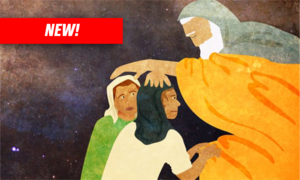- The Drama Before the Blessings
Jacob’s grandchildren gather to receive his blessing before his passing, and Jacob asks his son, Joseph, “Who are they?” Rashi explains that the Divine spirit left Jacob, prompting him to ask “Where did these children come from that they are unworthy of blessing?” Joseph produced his marriage documents to show his father that they were his children, born in purity and holiness. (Source 1)
Why doesn’t Rashi explain simply, that Jacob’s vision was deteriorating so he asked Joseph who the youngsters accompanying him were, and Joseph answered that they were his children? The Rebbe explains that when looking at the full picture, it’s clear that despite his poor eyesight, Jacob knew these were Joseph’s children coming to be blessed. His question “Who are they?” thus must have had a deeper meaning.
No explanation was offered to Jacob for why the Divine spirit had left him. The Rebbe explains that Jacob recognized that Menashe and Ephraim were righteous, he therefore feared that the issue may be that Joseph’s marriage to Osnat wasn’t conducted in a holy manner. This is why Joseph showed his father the marriage documents, to demonstrate that his marriage was religiously sound.
The story of the Rebbe stopping Ariel Sharon from boarding a plane that went on to be hijacked and taken to Algeria, and the Rebbe’s answer to Rabbi Segal about why he hadn’t stopped everyone from boarding.
- The Laws of Marriage Practiced by Our Forefathers
When Rashi says that Joseph showed his marriage documents to Jacob, this doesn’t mean marriage contracts as defined by today’s halachic system. Maimonides rules that before Sinai, the halachic concept of kidushin did not exist. Likewise, nowadays we also don’t consecrate the marriage with a written document. (Source 2)
Though it’s possible to suggest that our forefathers observed the post-Sinaitic laws, and Joseph may have used a written marriage contract, it is apparent that our forefathers did not observe these laws the same way they were observed post-Sinai. For instance, Jacob married two sisters, Amram married his aunt, and when Jacob himself married Leah, no mention is made of a written marriage document.
- Holy Marriage
Eirusin before nisuin – the final stage of marriage – is intended to lend respect and moral character to the marriage, so it is undertaken seriously and in holiness. Likewise, the ketubah is designed to protect the woman’s rights. Though this had no halachic validity before Sinai, nevertheless Joseph wrote a document stating his intentions before the marriage, giving his bride peace of mind, in order for it to be a holy and ethical relationship. This is what Joseph showed Jacob.
The way G-d relates to His people is analogous to the relationship of bride and groom. G-d must fulfill His obligations to His bride, to live with the Jewish people in love and harmony, and to sustain them in dignity.






